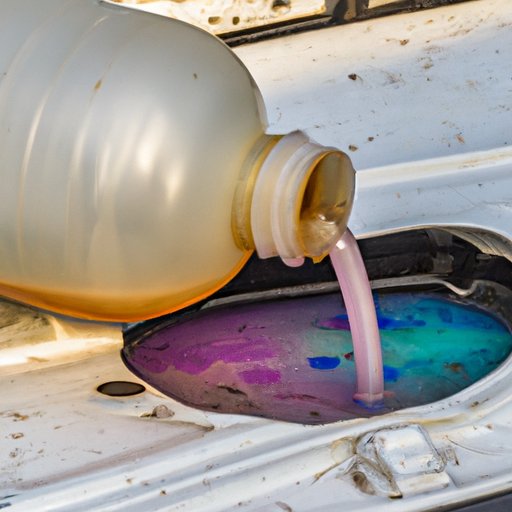Introduction
Improper car radiator fluid disposal poses significant environmental risks, including contamination of waterways and soil. The purpose of this article is to provide guidance and solutions for safely disposing of car radiator fluid at home. It’s essential to take responsible actions to protect our environment and preserve its natural resources.
Environmental Risks Associated with Improper Car Radiator Fluid Disposal
Car radiator fluid contains hazardous chemicals, including ethylene glycol and propylene glycol, which can harm the environment’s flora and fauna. When improperly disposed of, the chemicals can seep into the ground and contaminate water sources, leading to severe harm to our environment.
It’s crucial to take proper measures to ensure safe disposal to prevent these hazards from occurring. The good news is that ensuring environmentally conscious disposal of car radiator fluid is relatively simple when following the appropriate steps.
Step-by-Step Guide for Properly Disposing of Car Radiator Fluid
Research your local environmental regulations and find waste management facilities that accept car radiator fluids. Manufacturers are obligated to include specific instructions for disposing of the radiator fluid in the owner’s manual. If you don’t have the radiator fluid’s manufacturer’s instructions or are unsure of where to locate the nearest facility, contact your local council or environmental protection agency for guidance.
The next necessary step is preparing and transporting the fluid. Ensure the fluid is stored in a sealed, labeled container specifically designed for hazardous waste transportation. Use gloves and other protective attire when handling the fluid. Do not mix the fluid with other automotive liquids, such as oil or brake fluid, as this will render it non-recyclable.
Transport the fluid to the designated facility as soon as possible. Choose the safest possible route to avoid spillage, including avoiding difficult terrains, speed bumps, or steep hills. Always keep your container upright and avoid overfilling it. In case of any accidents or spills, follow the proper protocol for clean-up as recommended by your local authority.
Other safety tips when handling car radiator fluid include:
- Never pour the fluid down the drain or in trash cans.
- Avoid skin and eye contact or inhalation of fumes.
- Store the fluid in a cool and dry place.
- Do not mix different brands of car radiator fluids.
- Read the instructions on the fluid container before using the product.
Determining If Your Current Car Radiator Fluid is Safe to Dispose Of
The color of the car radiator fluid can give you an indication of its condition. Fluid that is transparent with a hint of green or yellow color means that it is in good condition to be used. However, if the fluid is discolored, it may be time to replace it. Other conditions that render your fluid toxic include:
- Unpleasant smell or metallic taste
- Cloudy, brown, or dirty-looking fluid
- Unusual foam or debris
By testing the quality of your fluid, you can determine if it is safe to be disposed of conventionally or able to be recycled. There are automotive fluid test kits available in auto part stores that enable you to determine if your radiator fluid is safe for disposal.
Repurposing Used Car Fluids
Instead of discarding your used car radiator fluid, you can repurpose it in innovative and wallet-friendly ways. Your creativity can give a new life to seemingly useless car fluids. Here are a few ideas:
- Used radiator fluid can be a perfect ingredient for outdoor candles. Mix the fluid in melted wax and pour it into glass jars. You can also dye the wax for color variations.
- Thicken your radiator fluid by boiling it to syrup consistency and make furniture or art pieces such as lamps, tables, or wall art. Slight heating should not affect the condition of the fluid.
- Use radiator fluid to remove grease and rust stains from your garage floors. Let the fluid sit for a few minutes and use a brush to scrub difficult stains off.
Benefits of Investing in a Car Radiator Fluid Recycling System
Investing in a radiator fluid recycling system can help reduce your environmental impact while also saving you money over the long run. Recycling your radiator fluid can reduce pollution, conserve natural resources, and help your business become more sustainable. Here are some benefits of procuring a recycling system:
- Recycling the fluid can reduce the amount of waste you create.
- With local facilities charging rates based on the volume of the waste deposited, recycling can help save your disposal cost.
- Recycling can help mitigate negative impacts on the environment. This includes minimizing the pollutants released by the manufacturing process and the greenhouse gas emissions produced during transportation.
- Recycling reduces the need for virgin materials, conserving natural resources like crude oil and also reducing our carbon footprint
Conclusion
Safe disposal of your car radiator fluid is an essential aspect of protecting the environment. By following this article’s guidelines, you can make sure you handle your radiator fluid with care. Recycling your radiator fluid is a small but practical step that you can take towards preserving the environment. By working together and showing conscious awareness of our environment, we can make a significant impact and create a safer, cleaner, and healthier future for everyone.
(Note: Is this article not meeting your expectations? Do you have knowledge or insights to share? Unlock new opportunities and expand your reach by joining our authors team. Click Registration to join us and share your expertise with our readers.)
